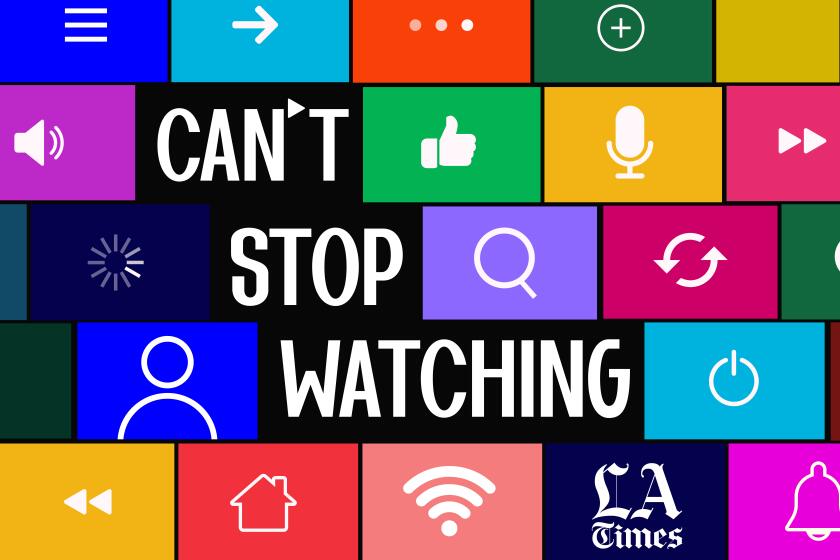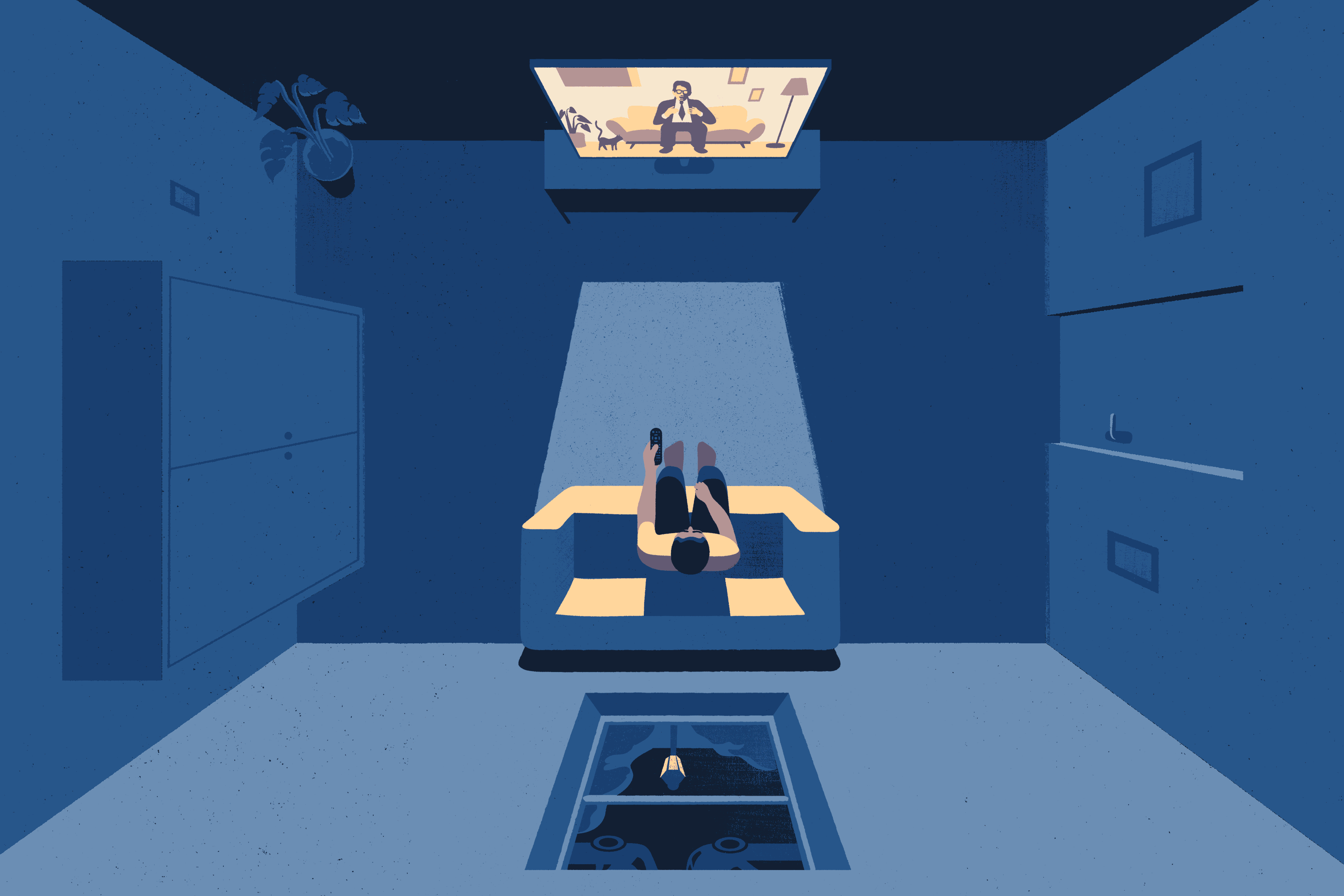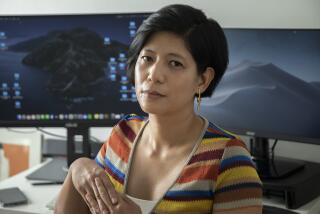‘Like landing a person on the moon’: A reality TV powerhouse adapts to coronavirus
- Share via
Bravo’s “Real Housewives” franchise is known for its epic, multipart reunions that feature glammed-up cast members sitting together on couches and rehashing drama from the season. There are always memorable moments: A stuffed bunny has been coldly returned, scepters have been thrown, hair has been pulled and plenty of housewives have stormed off set.
But this month brought a new first: a laptop snapped shut.
While it’s still anyone’s guess when traditional production can resume in Hollywood, many reality TV series are finding ways to adapt to the current reality, with subjects self-shooting with their camera phones or over video conference.
Bravo, a kingpin in the reality TV space, is among the networks finding ways to adapt its programming. Its late-night talk show, “Watch What Happens Live With Andy Cohen,” has been shooting remotely from Cohen’s home. “The Real Housewives of Beverly Hills” cast members had to shoot their final confessional interviews over video conference with producers. And last Sunday delivered the laptop moment (courtesy of a defiant NeNe Leakes) during the first-ever virtual reunion for “The Real Housewives of Atlanta.” (The second of its three installments runs Sunday.)
Shari Levine, the executive who oversees production of Bravo programming, has been sheltering at her home in New York since mid-March. She shares her perspective on how the network has shifted gears and the adjustments that may have to be made to its programming in a post-COVID-19 world.
Hear interviews with TV stars in the new L.A. Times podcast ‘Can’t Stop Watching.’
What were those early days like at the network as all this was happening? How many shows were in production?
We may have something like close to 40 shows in production at any time. To me, what is fascinating about this moment in time, in terms of making television, is how if this had happened two years earlier, it would be a very different story. I don’t think we could have continued. We’ve had shows that were in edit and they’ve continued to be in edit, and I’ve continued to screen shows and give notes and they’ve continued to respond to my notes. And that is about the technology of today and being able to do things in a way that I don’t even think we knew we could do it.
At first, shows that were actively shooting gradually stopped, and we had to come to grips with what was happening and what we were going to do. The shows that were shooting, which were some “Housewives” shows, we tabled them. We had hoped that we would come back to them soon. It’s proved to be otherwise.
When did talks start happening about finding ways to adapt? Like, deciding to do “Watch What Happens Live With Andy Cohen” from home or going virtual with the “Real Housewives of Atlanta” reunion.
It was sort of the journey of hope that I actually think everybody had as we went into this, where we thought, “OK, everybody needs to just pause for two weeks and we’ll all be back at it, we’ll move forward.” It didn’t work out that way. With the Atlanta reunion, we thought we might be able to do it. You have to sort of go back to two months ago. And I don’t even think the notion of socially distancing was part of the conversation. You and I couldn’t talk right now without that being a part of the conversation. But I don’t know that those words really existed back then.
A week before we were supposed to shoot the reunion, we were really that close to it — we had an entire team: a director and technicians and the set and everything else was figured out and we had our questions set up and we were ready to go and then the world hit pause and we hit pause. We just sat for a while. We weren’t sure how to move forward. And then as Zoom-ing and videoconferencing became a part of how everybody was interacting with each other, it became really clear: This is what we needed to do.
The late-night television shows started coming back in a very much more intimate, lo-fi kind of away and we used that as a jumping-off point. But there was a real question of, what’s it going to look like? And how are people going to engage with each other because they’re not all sitting in a room, they’re all sitting at home in front of their computers. And technically, can we do this? It’s a lot of people and they have to be able to hear each other. The head of that production company said it was like landing a person on the moon and then having to get them back again. It was really challenging, because we didn’t know what we needed to know.
What is it like for homebound writers and host to make late-night comedy in the time of coronavirus? ‘Not normal,’ says Seth Meyers.
How has it been engaging with the talent about finding ways to shoot? Has it taken some persuading?
Everybody’s at home. Cabin fever has set in for everybody. If you look at people’s social media, you see people trying to do whatever they can to be amused, to reach out to people, to socialize with people in the way that you do today, and the opportunity to stay involved with Bravo and stay involved with the shows was a natural. I don’t think anybody’s pushed back on it.
Is there enough programming to carry you through to the end of the year? Are you having to reevaluate how you stagger the slate to make things stretch?
We do have enough programming to get us through the end of the year. And we have programming to get us into next year. We’ve spaced shows out more; we might have had more programming this year than will end up airing, but we have a lot of shows going.
Like I said, I think it’s close to 40 series going at any one time. So we have a pretty deep bench. What we have not had to do, which other networks are doing, we haven’t done sort of quarantine specials. We do pretty well with just our regular programming, and we are sort of sticking with that.
Yes, we’ve seen some networks lean into what’s happening right now — TLC’s “90 Day Fiancé” has a quarantine edition. Reality shows can contextualize what we’re living through in a different way than scripted. But I imagine the shows that halted production, like “The Real Housewives of Orange County,” will have an element of it to the season when things pick back up?
The shows that shut down — “OC” shut, [“The Real Housewives of New Jersey”] had to go on pause, “Southern Charm” had to go on pause. They continued self shooting. And some of the [“Real Housewives of Orange County”] self shooting stuff has been out there on Instagram, and people have been commenting on it. You will see that in the future. We have been able to do remote interviews with all of the shows, and we needed to do it with most of the shows. And it’s amazing to me truly that they look and sound as good as they sound.
We did [“Below Deck Sailing Yacht – Watch with Kate Chastain”], which was our version of a quarantine show. Where Kate was at her parents’ home where she’s quarantining, and she watched an episode of “Below Deck Sailing Yacht.” What you got was Kate sitting at home during quarantine commenting on another version of “Below Deck,” which I thought was hilarious and did quite well for us. That’s sort of Bravo style of doing [quarantine programming].
A mode of communication designed to get us to stay home, often skewered as the “boob tube” or “idiot box,” TV kept its lights on as others flickered out.
I know this varies depending on the production and the environment of what they’re shooting, but how many crew members are typically on hand filming at any given time? And how do you see that changing when regular production resumes?
It will be far fewer. There can be large numbers of people who are around, and we are looking at making that number as small as possible. The number of cameras that will be in a room at any one time will go down. So the style of shooting will be a little bit different. The people will be more dedicated; don’t want a lot of different strangers walking in and out of someone’s home. So we are changing the style in which we go forward on it. We’ll see what happens. It may have a more of a documentary feel to it, because it may sort of feel more run and gun, which you get with documentaries — I don’t know because we haven’t started it yet. Whatever it ends up being, it will just be and it’s part of this moment in time. I really think there is permission, even for Bravo, which is more of a glossy look network, to reflect exactly what’s going on right now.
The demand for content is higher than it has ever been; everyone’s at home and many people are watching TV to help pass time. But how do you think television, specifically reality TV, will be different in a post-COVID world?
A lot of reality television is predicated on people being around a lot of other people and being very up close. There’s a reason why “Love Island” hit pause. For a moment, or for a long moment, those sorts of interactions will probably be much smaller. “Housewives,” where you’re together and you’re out and about and you’re doing things, it will be less of that. You’ll see it, but I think you’ll see it in a smaller capacity, as opposed to a larger capacity.
I think about the trips that happen on some of the shows...
What has always been a part of “Southern Charm” is local trips — they go out hunting or they go to someone’s farm. We sort of said, “Yup, lots of outdoor trips and outdoor activities.” You can definitely see that that’s what we’re going to see more of. That works for “Southern Charm.” I’m not sure what the version of that for some of the “Housewives” is going to be. But I do imagine there’s a lot more outdoor shooting. I just think it feels safer for everybody.
Do you see what’s happening changing the tone of Bravo programming? These shows are very aspirational, and a lot of viewers are dealing with economic pressures.
[On] “Housewives,” even though it’s an aspirational show and you see people who have means spending and enjoying, we also track people’s lives. And we went through different economic roller coasters earlier, years ago, and we saw people have bankruptcies on “OC.” We saw people have a house foreclosed on them, and we didn’t shy away from any of that. I think the show has always reflected the real means of the people who were on it and as those get challenged or as they shift we will reflect that as well.
We’ve already tracked the ups and downs of those living aspirationally in the different seasons of [“Million Dollar Listing”]. We have covered real estate busts as well as booms, and show our brokers dealing with whatever the reality of the times presents. We will continue to do that.
More to Read
The complete guide to home viewing
Get Screen Gab for everything about the TV shows and streaming movies everyone’s talking about.
You may occasionally receive promotional content from the Los Angeles Times.









